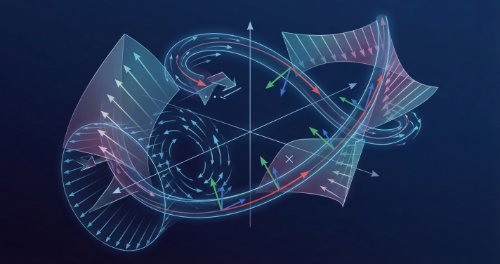Welcome - Introduction | Scalar, Vector and Triple Products of Vectors (Undergraduate Foundation)
SPONSORED Get Personalized Tutoring NowStruggling with a tough concept or looking to advance your skills? Our expert tutors offer one-to-one guidance tailored to your unique needs.
Get instant support, clear explanations, and practical strategies to master even the most challenging subjects. With flexible scheduling and customized learning plans, success is just a session away.
Book your personalized tutoring today and start achieving your academic goals!
Get Personalized Tutoring NowStruggling with a tough concept or looking to advance your skills? Our expert tutors offer one-to-one guidance tailored to your unique needs.
Get instant support, clear explanations, and practical strategies to master even the most challenging subjects. With flexible scheduling and customized learning plans, success is just a session away.
Book your personalized tutoring today and start achieving your academic goals!
Struggling with a tough concept or looking to advance your skills? Our expert tutors offer one-to-one guidance tailored to your unique needs. Get instant support, clear explanations, and practical strategies to master even the most challenging subjects. With flexible scheduling and customized learning plans, success is just a session away. Book your personalized tutoring today and start achieving your academic goals!

Scalar, Vector and Triple Products of Vectors (Undergraduate Foundation)
This course moves beyond basic vector algebra to cover the three critical methods of vector multiplication and their geometric applications. We systematically analyse the scalar (dot) product and vector (cross) product, followed by both scalar and vector triple products. The curriculum concludes by consolidating these skills to solve abstract vector equations and formulate the vector equations of straight lines in three dimensions.
These operations are not abstract; they are the language of physical science and engineering. The scalar product is the standard tool for calculating work done by a force and projecting vectors. The vector product is indispensable for defining torque, angular momentum, and magnetic forces. Mastery of these products allows for precise analysis of forces, rotations, and spatial relationships in real-world systems.
Upon completion, you will calculate scalar, vector, and triple products for any given vectors. You will apply these products to solve geometric problems, including testing for perpendicularity and parallelism and finding the area of a parallelogram. Critically, you will master the techniques required to solve complex vector equations and derive the vector equation of a line using various input conditions.
This course is designed for first-year undergraduate students in Engineering, Physics, and Applied Mathematics. It requires prior knowledge of basic vector addition and scalar multiplication. This programme provides the necessary rigorous foundation in vector products, making it a critical prerequisite for subsequent study in classical mechanics, electromagnetism, and linear algebra.
Scalar, Vector and Triple Products of Vectors (Undergraduate Foundation)
This course moves beyond basic vector algebra to cover the three critical methods of vector multiplication and their geometric applications. We systematically analyse the scalar (dot) product and vector (cross) product, followed by both scalar and vector triple products. The curriculum concludes by consolidating these skills to solve abstract vector equations and formulate the vector equations of straight lines in three dimensions. These operations are not abstract; they are the language of physical science and engineering. The scalar product is the standard tool for calculating work done by a force and projecting vectors. The vector product is indispensable for defining torque, angular momentum, and magnetic forces. Mastery of these products allows for precise analysis of forces, rotations, and spatial relationships in real-world systems. Upon completion, you will calculate scalar, vector, and triple products for any given vectors. You will apply these products to solve geometric problems, including testing for perpendicularity and parallelism and finding the area of a parallelogram. Critically, you will master the techniques required to solve complex vector equations and derive the vector equation of a line using various input conditions. This course is designed for first-year undergraduate students in Engineering, Physics, and Applied Mathematics. It requires prior knowledge of basic vector addition and scalar multiplication. This programme provides the necessary rigorous foundation in vector products, making it a critical prerequisite for subsequent study in classical mechanics, electromagnetism, and linear algebra.

MTH 103: Elementary Mathematics III - Vectors, Geometry and Dynamics
This comprehensive learning track guides you through the complete world of vector analysis. We begin with the fundamentals of vector algebra and its application to foundational geometry. You will then master scalar, vector, and triple products before using them to construct the vector equations of lines, planes, and conics. The journey culminates in advanced topics, including vector calculus, its applications in classical mechanics, and an introduction to differential geometry.
Vectors are the essential language used to describe our physical world, making their mastery non-negotiable for any serious student of science or engineering. This track is designed to build your intuition for spatial reasoning and equip you with a powerful problem-solving toolkit. You will see direct applications in mechanics, analyzing forces and motion; in geometry, calculating angles and distances; and in calculus, modeling dynamic change over time.
While this track is tailored to the first-year university curriculum for MTH 104 at Obafemi Awolowo University, Ile-Ife, Nigeria, it is an invaluable resource for a wide range of learners. It is ideal for any undergraduate student in mathematics, physics, engineering, or computer science seeking a comprehensive understanding of vector analysis. Furthermore, it serves as an excellent and thorough refresher for professionals who wish to solidify their foundational knowledge of this critical subject.
MTH 103: Elementary Mathematics III - Vectors, Geometry and Dynamics
This comprehensive learning track guides you through the complete world of vector analysis. We begin with the fundamentals of vector algebra and its application to foundational geometry. You will then master scalar, vector, and triple products before using them to construct the vector equations of lines, planes, and conics. The journey culminates in advanced topics, including vector calculus, its applications in classical mechanics, and an introduction to differential geometry. Vectors are the essential language used to describe our physical world, making their mastery non-negotiable for any serious student of science or engineering. This track is designed to build your intuition for spatial reasoning and equip you with a powerful problem-solving toolkit. You will see direct applications in mechanics, analyzing forces and motion; in geometry, calculating angles and distances; and in calculus, modeling dynamic change over time. While this track is tailored to the first-year university curriculum for MTH 104 at Obafemi Awolowo University, Ile-Ife, Nigeria, it is an invaluable resource for a wide range of learners. It is ideal for any undergraduate student in mathematics, physics, engineering, or computer science seeking a comprehensive understanding of vector analysis. Furthermore, it serves as an excellent and thorough refresher for professionals who wish to solidify their foundational knowledge of this critical subject.

MTH 210: Vector Analysis
Vector analysis is the mathematical backbone of classical mechanics, electromagnetism, and fluid dynamics. This learning track delivers the complete NUC CCMAS MTH 210 curriculum, rigorously progressing from fundamental vector algebra to the advanced differential and integral calculus of scalar and vector fields used in complex engineering and scientific modelling.
This programme is targeted at undergraduates in engineering, physics, mathematics, and computer science. It provides the essential mathematical toolkit for students entering disciplines that rely on applied mathematics and spatial analysis, and serves as a rigorous refresher for professionals needing to solidify their command of vector principles.
You will master the full spectrum of vector operations including dot, cross, and triple products, and apply them to solve geometric problems and vector equations. You will acquire the skills to analyze the differential geometry of curves using the Frenet-Serret framework and apply the powerful gradient, divergence, curl, and Laplacian operators in various coordinate systems. Completion establishes the critical mathematical foundation demanded for advanced studies in continuum mechanics, electrodynamics, and theoretical physics.
MTH 210: Vector Analysis
Vector analysis is the mathematical backbone of classical mechanics, electromagnetism, and fluid dynamics. This learning track delivers the complete NUC CCMAS MTH 210 curriculum, rigorously progressing from fundamental vector algebra to the advanced differential and integral calculus of scalar and vector fields used in complex engineering and scientific modelling. This programme is targeted at undergraduates in engineering, physics, mathematics, and computer science. It provides the essential mathematical toolkit for students entering disciplines that rely on applied mathematics and spatial analysis, and serves as a rigorous refresher for professionals needing to solidify their command of vector principles. You will master the full spectrum of vector operations including dot, cross, and triple products, and apply them to solve geometric problems and vector equations. You will acquire the skills to analyze the differential geometry of curves using the Frenet-Serret framework and apply the powerful gradient, divergence, curl, and Laplacian operators in various coordinate systems. Completion establishes the critical mathematical foundation demanded for advanced studies in continuum mechanics, electrodynamics, and theoretical physics.